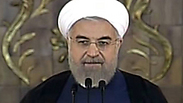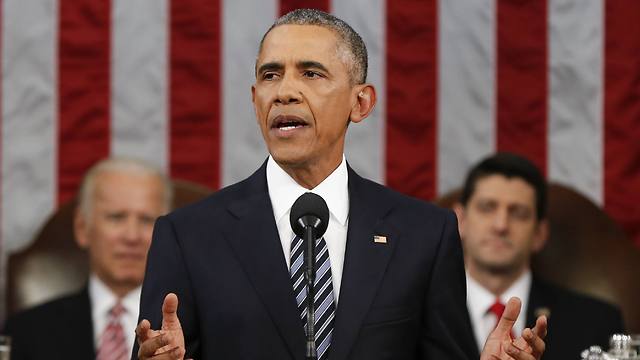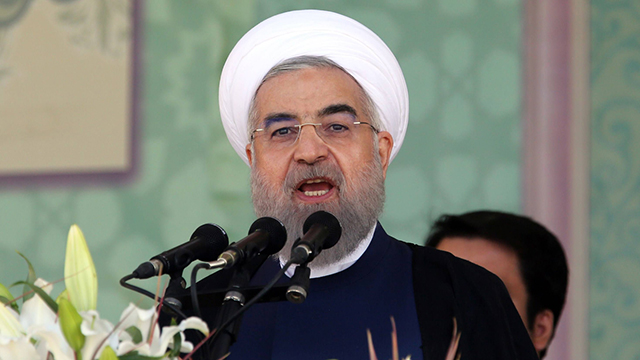
President Barack Obama on Sunday heralded the implementation of a nuclear deal with Iran, but said he is still steadfast against Tehran’s threat to Israel and others in the region.
The United States on Sunday imposed sanctions on 11 companies and individuals for supplying Iran's ballistic missile program, the US Treasury Department said, a day after world powers lifted the crippling sanctions against the Islamic Republic over its nuclear program.
The new sanctions came after the Obama administration delayed the action for more than two weeks during tense negotiations to free five American prisoners, according to people familiar with the matter.
The missile program "poses a significant threat to regional and global security, and it will continue to be subject to international sanctions," said Adam J. Szubin, the Department of the Treasury's acting undersecretary for terrorism and financial intelligence in a statement.
"This is a good day because once again we are seeing what's possible through strong American diplomacy," Obama said at the White House.
"These things are a reminder of what we can achieve when we lead with strength and with wisdom."
He said the US has made it clear that it will "vigorously press sanctions against Iranian activities" outside the terms of the nuclear agreement. Szubin cited Iran's "support for terrorism, regional destabilization, human rights abuses, and ballistic missile program."
Also Sunday, Secretary of State John Kerry said in a statement that the US and Iran had settled a dispute over $400 million in Iranian money dating back to before the 1979 Islamic Revolution and end of diplomatic ties. The Iranians also get $1.3 billion in interest. At issue was money used by Iran to buy military equipment from the U.S. before the break in ties between the countries.
Hours earlier, Iranian President Hassan Rouhani that the official implementation of the landmark nuclear deal reached between Tehran and six world powers has satisfied all parties except Israel and hardliners in the US Congress.
Iran ended years of economic isolation when world powers lifted the crippling sanctions against the Islamic Republic on Saturday in return for Tehran complying with a deal to curb its nuclear ambitions.
"In (implementing) the deal, all are happy except Zionists, warmongers, sowers of discord among Islamic nations and extremists in the US. The rest are happy," Rouhani said.
Prime Minister Benjamin Netanyahu said on Sunday that "Israel will continue to monitor all of Iran's international violations, including regarding the nuclear agreement, the ballistic missile agreement and terrorism."
"What is clear is that Iran will now have more resources to divert to terrorism and its aggression in the region and around the world, and Israel is prepared to deal with any threat," Netanyahu added.
He urged the international community to "enact severe and aggressive sanctions against each violation," arguing that "were it not for our efforts to lead sanctions and thwart Iran's nuclear program, Iran would have had nuclear weapons some time ago."
In a speech to the Iranian parliament on Sunday morning, Rouhani heralded the deal as a "golden page" in the country's history, which has "opened new windows for engagement with the world."
Rouhani also said the deal was a win for all negotiating parties and all factions inside Iran. "Nobody has been defeated in the deal neither inside the country nor the countries that were negotiating with us," he said, referring to the United States, Britain, France, Russia, China and Germany.
"The nuclear deal is an opportunity that we should use to develop the country, improve the welfare of the nation, and create stability and security in the region," Rouhani said as he presented a draft budget for the next fiscal year to parliament.
A strong supporter of the agreement, Rouhani sent out a celebratory tweet calling it a "glorious victory" late Saturday night while the speeches in Vienna were still taking place.
Tehran also announced the release of five Americans including Washington Post reporter Jason Rezaian as part of a prisoner swap with the United States, to reduce decades-old hostility.
As tens of billions of dollars worth of Iranian assets were due to be unfrozen and barriers to international business come down, Rouhani said the deal was a "turning point" for the economy of 80 million people.
He said the deal was an opportunity for Iran's economy to cut its "umbilical cord" to oil while prices were low.
Benchmark Brent crude closed below $29 on Friday, and may fall further as Iran has pledged to raise its supply after sanctions were lifted.
The International Atomic Energy Agency ruled on Saturday that Iran had abided by an agreement last year with six world powers to curtail its nuclear program, triggering the end of sanctions.
IAEA chief Yukiya Amano will travel to Tehran on Sunday to meet Rouhani and the head of the Atomic Energy Organisation of Iran, the IAEA said on Saturday. Iranian Foreign Minister Mohammad Javad Zarif was also back in Tehran by Sunday.
Minutes after the IAEA's ruling, the United States formally lifted banking, steel, shipping and other sanctions on Iran. The European Union likewise ended all nuclear-related economic and financial sanctions against the country.
The IAEA's confirmation that Iran had fulfilled its commitments under the nuclear deal also automatically ended most United Nations sanctions on the country.


















